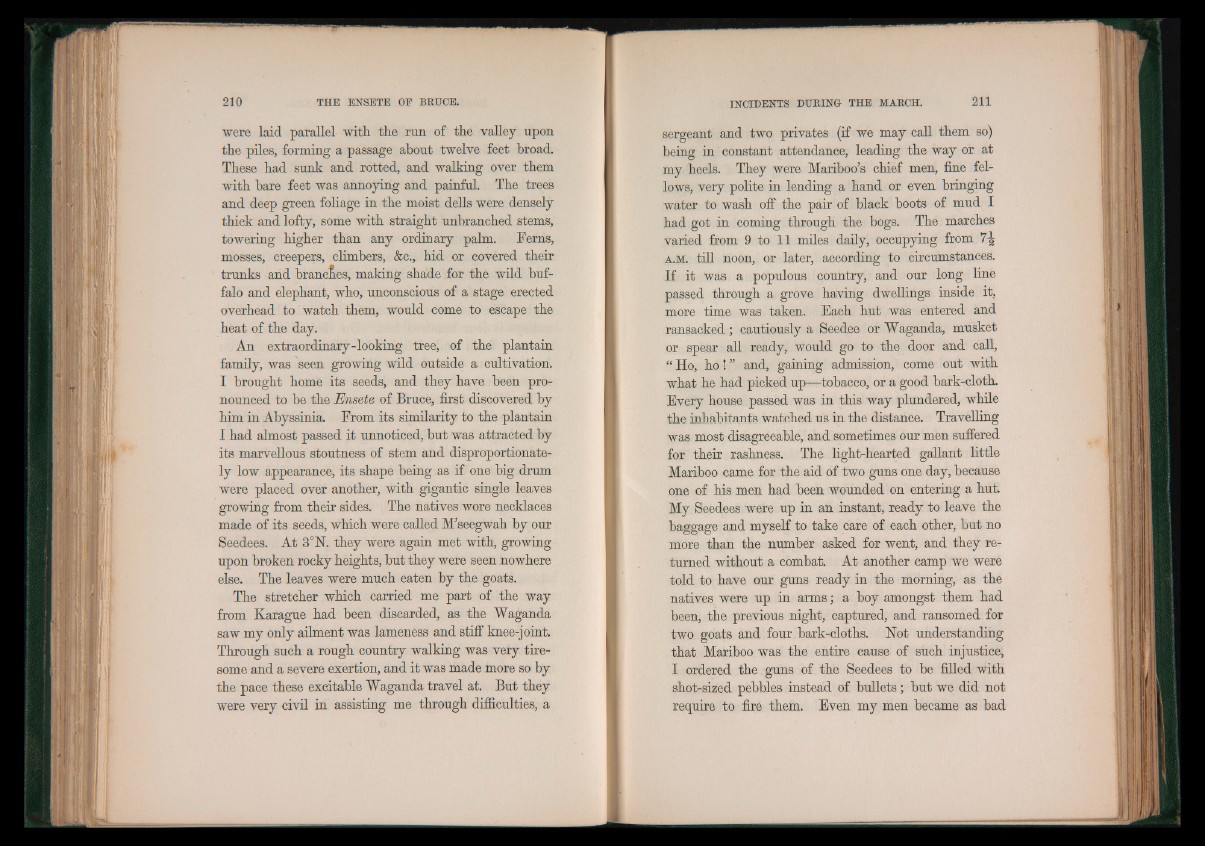
were laid parallel with the run. of the valley upon
the piles, forming a passage about twelve feet broad.
These had sunk and rotted, and walking over them
with bare feet was annoying and painful. The trees
and deep green foliage in the moist dells were densely
thick and lofty, some with straight unbranched stems,
towering higher than any ordinary palm. Ferns,
mosses, creepers, climbers, &c., hid or covered their
trunks and branches, making shade for the wild buffalo
and elephant, who, unconscious of a stage erected
overhead to watch them, would come to escape the
heat of the day.
An extraordinary-looking tree, of the plantain
family, was seen growing wild outside a cultivation.
I brought home its seeds, and they have been pronounced
to be the Ensete of Bruce, first discovered by
him in Abyssinia. From its similarity to the plantain
I had almost passed it unnoticed, but was attracted by
its marvellous stoutness of stem and disproportionately
low appearance, its shape being as if one big drum
were placed over another, with gigantic single leaves
growing from their sides. The natives wore necklaces
made of its seeds, which were called M’seegwah by our
Seedees. At 3°N. they were again met with, growing
upon broken rocky heights, but they were seen nowhere
else. The leaves were much eaten by the goats.
The stretcher which carried me part of the way
from Karague had been discarded, as the Waganda
saw my only ailment was lameness and stiff knee-joint.
Through such a rough country walking was very tiresome
and a severe exertion, and it was made more so by
the pace these excitable Waganda travel at. But they
were very civil in assisting me through difficulties, a
sergeant and two privates (if we may call them so)
being in constant attendance, leading the way or at
my heels. They were Mariboo’s chief men, fine fellows,
very polite in lending a hand or even bringing
water to wash off the pair of black boots of mud I
had got in coming through the bogs. The marches
varied from 9 to 11 miles daily, occupying from
a.m. till noon, or later, according to circumstances.
If it was a populous country, and our long line
passed through a grove having dwellings inside it,
more time was taken. Each hut was entered and
ransacked; cautiously a Seedee or Waganda, musket
or spear all ready, would go to the door and call,
“ Ho, h o ! ” and, gaining admission, come out with
what he had picked up—tobacco, or a good bark-cloth.
Every house passed was in this way plundered, while
the inhabitants watched us in the distance. Travelling
was most disagreeable, and sometimes our men suffered
for their rashness. The light-hearted gallant little
Mariboo came for the aid of two guns one day, because
one of his men had been wounded on entering a hut.
My Seedees were up in an instant, ready to leave the
baggage and myself to take care of each other, but no
more than the number asked for went, and they returned
without a combat. At another camp we were
told to have our guns ready in the morning, as the
natives were up in arms; a boy amongst them had
been, the previous night, captured, and ransomed for
two goats and four bark-cloths. Not understanding
that Mariboo was the entire cause of such injustice,
I ordered the guns of the Seedees to be filled with
shot-sized pebbles instead of bullets; but we did not
require to fire them. Even my men became as bad